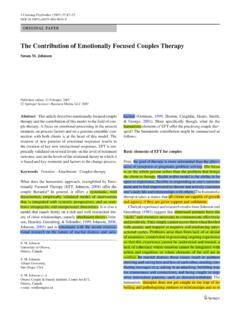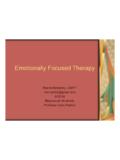Transcription of Broken Bonds: An Emotionally Focused Approach to Infidelity
1 CLINICAL MODELSB roken Bonds: An Emotionally Focused Approachto InfidelitySusan M. comes in many forms. Different meanings may beassigned to the various forms. This article discusses not only the differentforms Infidelity may take, but also the larger issue in the field of couple andfamily therapy ; the meaning frame for understanding the impact of differentkinds of events, specific relationship problems, and how to deal with is done through the use of emotion Focused therapy and the context ofadult attachment.[Article copies available for a fee from The Haworth Docu-ment Delivery Service: 1-800-HAWORTH.]
2 E-mail address: Website: < > 2005 by TheHaworth Press, Inc. All rights reserved.]Susan M. Johnson, EdD, is Professor of Psychology, University of Ottawa, and Direc-tor of Ottawa Couple and Family Institute, OCFI #201, 1869 Carling Avenue, Ottawa,Canada K2A 1E6.[Haworth co-indexing entry note]: Broken Bonds: An Emotionally Focused Approach to Infidelity . Johnson, Susan M. Co-published simultaneously inJournal of Couple & Relationship therapy (The HaworthPress) Vol. 4, No. 2/3, 2005, pp. 17-29; and:Handbook of the Clinical Treatment of Infidelity (ed: Fred , Katherine M.)
3 Hertlein, and Joseph L. Wetchler) The Haworth Press, Inc., 2005, pp. 17-29. Single ormultiple copies of this article are available for a fee from The Haworth Document Delivery Service[1-800-HAWORTH, 9:00 - 5:00 (EST). E-mail address: online at 2005 by The Haworth Press, Inc. All rights , attachment, Emotionally Focused couplestherapy, forgivenessInfidelity comes in all shapes and sizes. A one night stand at a profes-sional conference that is framed as a superficial chance encounter or afour-year alternate relationship that involves day-to-day deception andstrong emotional involvement.]
4 Some people begin an affair in order toend a marriage; some people state that they believe their marriage is fineand they also want to have an occasional recreational affair. Infidelityalso can be interpreted in many different ways. One spouse may be ableto accept a partner briefly turning to another in particular circumstances,another spouse may not be able to tolerate even a flirtation that does notresult in actual intercourse, or finding photos of a scantily clad secretaryin her husband s briefcase. Sex and sex with people other than yourspouse has different meanings for different people.
5 However, in gen-eral, perceived Infidelity is experienced as a threat to adult love relation-ships and undermines the stability of these relationships. It is almost asdamaging to these relationships as physical abuse (Whisman, Dixon, &Johnson, 1997) and it is a frequent precursor to seeking couple issue of the host of different meanings that can be assigned to in-fidelity echoes a larger issue in the field of couple and family therapy ,namely the lack of a coherent well-researched theory of adult love toserve as a context a meaning frame for understanding the impact of dif-ferent kinds of events, specific relationship problems and how to dealwith them.
6 The Emotionally Focused model (Greenberg & Johnson,1988; Johnson, 1996; Johnson, 2002) views adult love relationshipsthrough the lens of attachment theory (Bowlby, 1969, 1988; Johnson,2003 a, b). Infidelity is then seen as a potentially devastating threat to at-tachment security that hyper-activates the deceived spouse s attach-ment needs and fears and so creates a crisis that must be addressed andresolved if the relationship is to survive and thrive. This chapter willdiscuss Infidelity defined in the dictionary as unfaithfulness in termsof attachment theory and as a potential attachment injury (Johnson,Makinen, & Millikin, 2001) that undermines the attachment bond be-tween an EFT therapist listens to spouses describe the impact of theirpartners extra-marital involvement with another, he/she hears that theseclients talk in attachment terms.
7 In my office, Margie told her husband, What hurts the most is thatI was not in your mind I did not matter toyouin these moments with her. You did nottake me into OF THE CLINICAL TREATMENT OF Infidelity were willing to risk our relationship for this excitement. How can Iever depend on you again? Also, you lied to me and broke our commit-ment. I am wounded I havelost the sense of usas a couple. And when Iasked you when I was weeping and asking you you avoided, shruggedit off likemy pain didn t matter to youand you tried to put me off andcajole me with hugs. I can t hug you let you close.
8 I can t kiss you thinking that you gave her kisses too. But Ican t bear the distance be-tween useither. Ineed your reassurance and I don t believe it if yougive it. There isno safety no ground to stand onhere. These words(especially those italicized) echo the observations of attachment theo-rists who point out that a secure attachment is based on a sense that youexist and are prized in the mind of the other, that you can depend on theother when you need him/her and that this other will cherish and protectrather than reject or abandon you. When this sense is shattered there is atraumatic loss and the process of separation distress, angry protest alter-nating with seeking contact and clinging to the other, as well as depres-sion and despair are elicited.
9 Margie s final words about her ambiva-lence, her distancing and her need, also echo the words of theorists whopoint out that attachment dilemmas where the loved one is both thesource of and solution to pain are fundamentally disorganizing andoverwhelming to deal with. For many clients, affairs constitute whatEFT therapists have termed an attachment injury (Johnson, 2002), atrauma or wound, a violation of trust that brings the nature of the wholerelationship into question and must be dealt with if the relationship is tosurvive. This paper will explicate the nature of such attachment injuriestogether with the EFT Approach to resolving ATTACHMENT FRAMEWORKA clear theoretical framework on adult love is invaluable to the cou-ple therapist.
10 It not only helps us understand partners wounds and diffi-culties and how they impact a relationship, it offers a map to effectiveintervention (Johnson, 2003a). Without such a framework it is often dif-ficult to delineate the key elements of negative events and the keychange events necessary to remedy them. The forgiveness literature, forexample, offers little consensus as to the essential nature of specific in-juries and what the critical elements are in the forgiveness process. Thisliterature, of obvious relevance to the present topic, has not been inte-grated into broader theories of marriage (Coop Gordon, Baucom, &Snyder, 2000).










